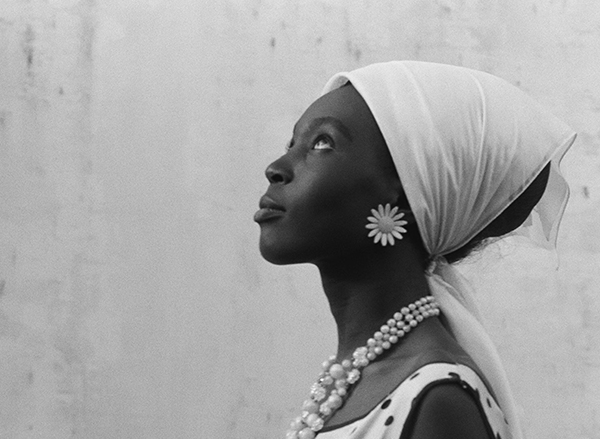Black Girl
Some viewers will watch 1966's BLACK GIRL and be unaffected by its tragic story. They'll feel the character of Diouana is unreasonable as she laments her lot (in voice over) as a house servant for a wealthy white French couple (That's the job!). By that point, the Senegalese young woman has traveled to Antibes, France to continue duties begun in her homeland of Dakar as a nanny for "Madame" and "Monsieur"'s young children. But soon Diouana, who was promised opportunities to explore and enjoy a new country, is rarely allowed to leave the flat and is asked to mop floors, scrub bathtubs, and cook rice. She has no friends, "except the grocer." This is not what she signed up for. And the children have not even arrived. Are they at boarding school?
Diouana (Mbissine Therese Diop) also sees a change in how she is treated, mainly by Madame. She was once amiable and fair but now scowls and plays the taskmaster. Barely a compliment paid for her hard work. Hardly allows her employee time to rest. Berates her constantly. Scolds her for donning the fancy clothes she expected to wear in her new cosmopolitan lifestyle. What happened between Africa and France? What had changed?
Diouana's story is most certainly a larger statement on neocolonialism. Writer/director Ousmane Sembene presents a simple narrative that quietly but unmistakably shakes its fist at the Europeans. A lot of injustice to consider. The young protagonist, who cannot read or write, is entirely vulnerable in her new domecile, which quickly feels like a prison. Her self esteem is eroded daily and humiliation comes from a dinner guest who insists on kissing her to say that he actually smooched a black girl. Diouana's only reminder of her home and culture is the African mask on the wall, the one she gave her masters as a gift in better times. To them, it's a cool artifact. To her, it's identity. Humanity. Something far above the price of francs. The mask will be a key item and symbol straight to the very end of this story.
BLACK GIRL, just about one hour in length, was Sembene's debut motion picture and can be described as minimalist, austere, and direct, but is also uniquely poetic in its indictment of servitude and (in)humanity. To say nothing of alienation. It goes far beyond race. It all feels more literary than cinematic, yet succeeds powerfully in both respects. The finale and subsequent scenes will haunt (thoughtful) viewers for years to follow. As they should. One hopes that the sort who would be cold to Diouana's plight and fate would be likewise sufficiently shaken. Bravo for that final shot.
P.S. Consider carefully Sembene's focus on that bathtub, how it is scrubbed in the early moments of the film. As if in preparation for something.....



Comments